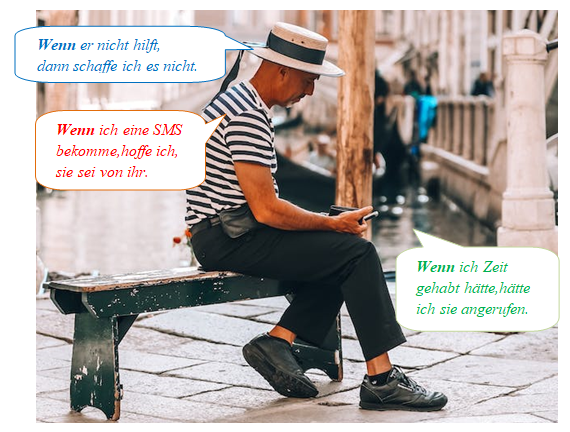In this lesson, you will learn all about “weil” and “da” conjunctions in German and about dependent clauses with “weil” and “da.” You will learn about the characteristics of these sentences, how they function, and the word order in the sentence. Sentences with “weil” and “da” are the most commonly used, but there are other similar conjunctions that we will mention in this lesson.
Thank you for reading this post, don't forget to subscribe!CONTENTS
Casual conjunctions
weil and da – ‘because’, ‘as’, ‘since’
Darum, deshalb, deswegen
Denn & Weil
Nun da (now that, seeing that)
Zumal (especially as/since)
Umso mehr…, als/da/weil (all the more… because)
Casual conjunctions
The German conjunctions expressing a cause or a reason are as follows:
da as, since
nun (da/wo) now that, seeing that
umso mehr, als all the more because
weil because
zumal especially as
Weil and da – ‘because’, ‘as’, ‘since’
The difference between “weil” and “da” is relatively small, similar to the difference between the English words “because” and “as” (or “since”).
In general, “da” is more commonly used in the North Germany or in more formal writing and “da”- clauses usually indicate a reason that is already known.
Clauses with the conjunction “da” und “weil” can come first, before the main clause, but also after the main clause.
For example:
Wir kommen zu spät, weil der Zug ausgefallen ist. – We are late because the train has been canceled.
Weil der Zug ausgefallen ist, kommen wir zu spät. (When the dependent comes before the main clause, the verb comes in the first position.)
Da das Wetter heute schlecht ist, bleiben wir zu Hause. – As the weather is bad today, we stay at home.
Wir bleiben zu Hause, da das Wetter heute schlecht ist.
Darum, deshalb, deswegen
A weil-clause can be preceded by darum, deshalb or deswegen in the preceding main clause. This emphasizes the reason given in the weil-clause.
For example:
Er kann darum/deshalb/deswegen nicht kommen, weil er Fiber hat. – He can’t come because/therefore because he has fiber.
Denn & Weil
In German, the conjunctions “denn” and “weil” both correspond to the English “because.” However, it’s important to note that “denn” is a COORDINATING, not a subordinating conjunction. It is used in main clauses with the verb in the second position, and clauses with “denn” are NEVER in the first position in the sentence. “Denn” gives the reason for the event or action in the preceding clause.
For example:
Ich muss vorsichtig fahren, denn die Straßen sind naß. – I have to drive carefully because the roads are wet.
Wir müssen uns warm anziehen, denn es ist kalt. – We have to dress warmly because it’s cold.
The use of “denn” is becoming less common in everyday language, and “weil” is often used as a coordinating conjunction instead.
In this usage, the main clause is followed by a subordinate clause with the verb in the second position. However, it’s important to note that this usage is not considered standard German and should be avoided in written language.
When “weil” is used in this way, the subordinate clause always follows the main clause and provides a justification for the statement in the main clause.
For example:
Du musst langsamerer fahren, weil die Straße nass ist. – You have to slow down because the road is wet.
There is often a slight hesitation after “weil,” as if the justification is almost an afterthought.
For example:
Du musst langsamerer fahren, weil […] die Straße ist nass.
Nun da (now that, seeing that)
Nun da corresponds to English now that, seeing that. There are several alternatives to “nun da”. In formal writing, only “nun” is occasionally used. Other alternatives like nun wo, wo.. . (doch), da… nun (mal), are typical of colloquial language.
For example:
Nun, da sie hier ist, hörst du bitte ihre Seite der Geschichte. – Now that she’s here, please hear her side of the story.
Nun, da ich Chemiker bin, machte mich dies besonders neugierig. – Now that I am a chemist, this made me particularly curious.
Zumal (especially as/since)
Conjunction zumal is a stronger alternative to the conjunction da and corresponds to English especially as/since.
For example:
Du solltest wirklich pünktlich sein, zumal du die Projektleiterin bist. – You should really be punctual, especially as you are the project manager.
Der Smog ist hier schlimm, zumal in der Stadt. – The smog is bad here, especially as/since in the city.
Umso mehr…, als/da/weil (all the more… because)
Expression umso mehr…, als/da/weil correspond to English all the more … because.
For example:
Er freute sich umso mehr darüber, als/da/weil es von seinem Opa stammte. – He was all the more delighted about it because it came from his granddad.
Ich muss diese Woche umso mehr an dem Projekt arbeiten, als/da/weil ich es am Montag abgeben müssen. –I have to work all the more on the project this week because I have to hand it in on Monday.
Sie muss umso mehr lernen,als/da/weil dies ihre Abschlussprüfung ist. – She has to study all the more because this is her final exam.
Umso …, als can be used more generally, with other comparative adjectives:
Dieses Projekt ist umso wichtiger als unser derzeitiges Verkehrssystem veraltet ist.
This project is all the more important as our current transportation system is outdated.
See more:



